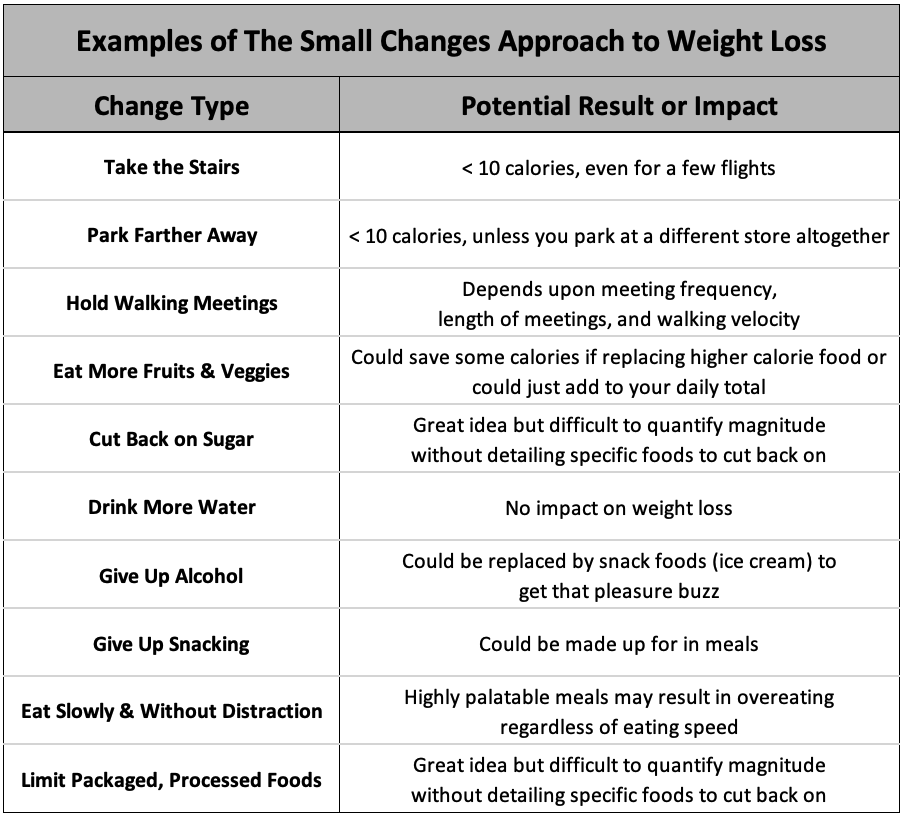The Truth about the Small Changes Approach to Weight Loss

Take the stairs, park farther away at the store, eat more fruits and veggies, cut back on sugar, drink more water – these are all part of the “small changes” approach to weight loss. The idea is that by making multiple small changes to your diet or exercise routine these changes will add up to big results.
The allure of the small changes approach to weight loss is that you don’t have to drastically change your life. Life is busy and change is hard, instead of having to blow up your entire life, the small changes approach makes weight loss more approachable, less overwhelming, and nudges people into developing better habits.
In theory, I love the small changes approach. I used to be a proponent of it. In reality though, it suffers from the same mathematical challenge as “trying to out exercise a poor diet”. Even if you made 10 little changes, the yield on those changes are either so small, inconsistent or replaced with another (compensatory) behavior that they are hardly worth doing for weight loss (see table 1).

Table 1. Examples of The Small Changes Approach to Weight Loss.
With that being said, the small changes approach to weight loss can be effective for a subset of people but there are four caveats that must be considered:
- How bad is your existing diet? If your current diet is absolutely horrendous, a few small changes may pay relatively large dividends. It’s difficult to quantify “absolutely horrendous” but I’d say in general, if you are consuming >3500 calories/day and are not an athlete, your diet is horrendous.
- How much weight do you have to lose? The more weight you have to lose, the more a few small changes will help make a difference, at least initially. This is because the more you weigh, the more body mass you have, and the more calories you need to consume to maintain that body mass. Even fat (adipose) tissue is metabolically active and requires energy (ATP) to stay alive. Most people with moderate to severe obesity have to consume over 3000 calories/day to maintain their body mass. Making a few small changes to lower their calorie intake will reduce their body mass.
However, with that being said, people with moderate to severe obesity have so much weight to lose that just decreasing their caloric intake by a little bit (a few hundred calories/day) will not lead to the type of weight loss they need or are seeking. A more aggressive approach is warranted (as I will detail in a bit).
If you are closer to your goal weight (<20-30 pounds to lose) a few small changes may lead to some weight loss. However, it should be noted that your body mass is already lower to begin with and so are the calories required to maintain your body mass. Cutting your caloric intake by a few hundred calories or increasing your expenditure by a few hundred calories may result in a wash. There will be plenty of days where you end up overconsuming and end up maintaining your body weight overall. Most people are in this boat.
- Is the small change actually a big change? Some small changes aren’t small changes at all. They’re big changes. Case in point. For many people, giving up soda is a small change. For others it is life altering. I once spoke with a person that would literally drink 1 case, yes, 24 cans of Coke each and every day before she went cold turkey and quit. I could hardly believe this was possible. How could you even consume that much liquid, let alone soda? So, for some, small changes can actually be big changes.
- Are you making small changes for health benefits or weight loss? For major weight loss to occur, small changes aren’t going to cut it. However, if your primary goal is to improve your health small changes may work for you. Small changes, whether to your diet or physical activity can lead to significant health improvements (i.e., increased fitness, heart health, blood glucose regulation, etc.) in the absence of significant weight loss.
Instead of taking the “small changes approach” to weight loss, I would try the “big changes approach”. Try focusing on the big-ticket items that will provide you with a significant return on your investment.
- Meal Planning Every Week
- Active Commuting (Bike to Work)
- Get 300 minutes of Exercise/Week
- Eat <1500 Calories/Day
- Commit to Cooking at Home
- Packing a Lunch
- Stop Eating Out
- Weigh Yourself at Least Weekly
- Log Your Food Calories
Rather than trying to gradually lose weight over time by making a series of small changes I would take the opposite approach. I would plan, plan, plan, and plan some more, pick a date to start your low-calorie diet, go as hard as you can for as long as you can. Develop a dedicated, hardcore, all-in, top priority, nothing else matters, I have to do this come hell or high-water mentality.
Why would I do this? Because the first two to three months of a weight loss diet are by FAR the most important three months of dieting you will ever go on and will determine how much you weigh months and even years from now (Figure 1).

Figure 1. Weight Loss in the First 2-3 Months of a Weight Loss Program Predicts How Much You Will Weigh for Years to Come. Individuals in this study were grouped into those who lost < 3%, 3-6%, and >6% of their body weight within the first two months of an identical weight loss program and tracked over the next eight years (Unick, JL; 2015, Obesity).
I have seen hundreds of studies with all kinds of diet types (low-fat, low-carb, high-protein, Paleo, you name it) that when graphed over time, weight loss is steep for the first three months before leveling off through six months, and coming back up a little bit between six months and a year (Figure 1). All of these diet graphs look just like the pattern displayed in figure 1! I just cannot tell you how many times I have seen this same occurrence again and again and again. But for some reason no one talks about it.
Losing weight as fast you can for the first three months reminds me of the Rodney Atkins song, “If You’re Going Through Hell” when he says,
If you’re going through Hell
Keep on going, don’t slow down
If you’re scared, don’t show it
You might get out
Before the devil even knows you’re there
I’m not going to try to explain it physiologically here, but it is almost like you need to hurry up and lose the weight (go through hell) before the devil (your body) realizes you are losing the weight. Because after he (it) finds out, it is so much more difficult to continue losing weight at the same rate. The small changes approach does not allow for the rapid weight loss to occur before the devil finds out. The devil is on to you before you even really get started. I’m not saying you can’t use the small changes approach to lose weight over time but I do think the “all in”, fast weight loss approach is superior.
In many ways the small changes approach to weight loss is a rebuttal to the “all or nothing” approach. Most people with obesity will readily admit that they aren’t eating the way they should. They may watch what they eat but don’t have a systematic plan for doing so. It sounds cruel to say they are doing nothing but let’s for argument’s sake say they are far closer to nothing than all. It then makes sense in peoples’ minds to do “something”, which is akin to the small changes approach.
In reality, the small changes approach generates false hope and ignores reality. Losing weight and keeping it off is super hard. You can’t just willy nilly change a few things and expect to get great results. Even if you change multiple small things they still don’t add up to the big ticket items. Initiating small changes is like telling someone all they have to do is run a 5k. Then when they start, you change the rules and they actually need to run a marathon.
I know, I know, if they start with the 5k they may like running and eventually get into marathon training. Running a 5k is better than doing nothing at all. I really like this train of thinking, but again the hundreds of weight loss studies that I have read showing that the majority of the weight is lost in the first three months doesn’t allow me to recommend a small changes approach.
This is why I recommend people go on a low-calorie diet (1000 – 1200 calories/day) for 4-6 weeks (or as long as they can tolerate) before transitioning into a diet of closer to 1500 calories/day to try to lose weight as fast as they can before the devil even knows you’re there.





Responses